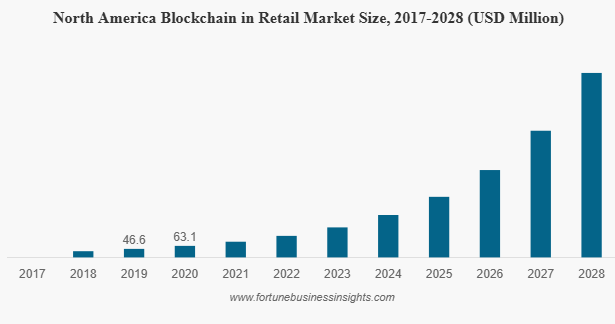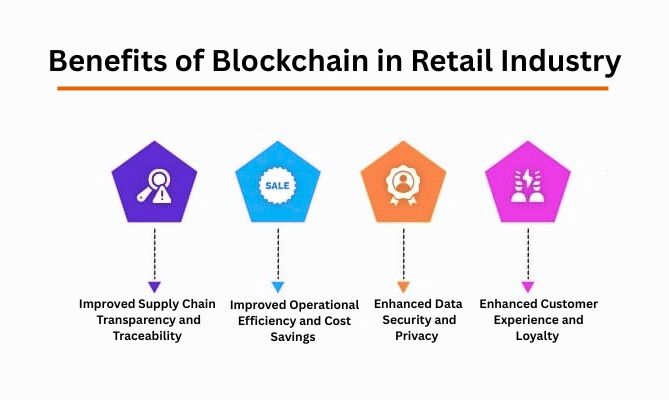The rise of blockchain in the retail industry has been significant. It is important for us to understand every single aspect related to it in detail to make the most out of this transformation and advancement that boosts consumer confidence and expectations.
Blockchain in retail has led to transparency, security and efficiency across all the processes. It is important for you to use the new ways to serve your customers and pave the way for growth and more opportunities. This is where blockchain proves to be a game changer. It will help you in terms of better management and enhance customer experience all the way through. Not only this, you will not have to worry about the frauds as every aspect of it will be encrypted.
Blockchain in the Supply Chain of the retail industry delivers transparency and brings trust among stakeholders. So, if you are thinking about investing in blockchain applications in retail, then we are here to help you understand every aspect of it in detail. Read on to know more.
Table of Contents
Statistics About Blockchain for Retail
Now let’s take a look at some of the numbers that show how blockchain is growing in the retail industry and making a big impact.
- The global blockchain market in retail is predicted to increase from USD 0.66 billion in 2022 to USD 203.27 billion by 2032.
- 40% of retailers believe that blockchain will enhance supply chain transparency and traceability.
- Implementing blockchain solutions can reduce fraud in retail transactions by up to 50%, significantly enhancing security.
- 75% of consumers are more likely to trust brands that use blockchain for product authenticity verification.
- The use of smart contracts in retail can cut administrative costs by as much as 30%, according to Market Intel.
- The NFT market within retail is expected to grow from $1 billion in 2021 to over $10 billion in 2025.
- Implementing Blockchain Asset Management can improve accuracy by over 90%.

These numbers show how blockchain is going to make a huge impact in the respective industry and pave the way for remarkable growth. If you are looking for the examples for the same, then below we discuss all the use cases related to it. Check it out.
Top Use Cases of Blockchain in Retail
Below are several prominent use cases of blockchain for retail, showcasing their practical applications through real-world case studies.
Supply Chain Transparency Through Blockchain
Blockchain enhances supply chain transparency in retail by providing an immutable record of product movement from origin to consumer. Each transaction, from manufacturing to delivery, is recorded on a distributed ledger, allowing stakeholders to track products in real-time. Enhanced visibility enables retailers to optimize their supply chain, reduce inefficiencies, and respond quickly to disruptions. Blockchain in retail offers a streamlined and secure way to manage complex supply chains, improving overall operational efficiency and customer satisfaction.
Verifying Product Authenticity Using Blockchain Technology
Counterfeit products pose a significant challenge for the retail industry, impacting brand reputation and consumer trust. Blockchain technology offers a robust solution for verifying product authenticity by creating a unique digital identity for each item. Retailers can also use blockchain to track and trace products throughout the supply chain, preventing counterfeit goods from entering the market.
Enhancing Customer Data Security in Retail
Customer data breaches are a growing concern for retailers, leading to financial losses and reputational damage. Blockchain technology offers a secure and decentralized way to store and manage customer data, minimizing the risk of unauthorized access. This enhanced data security builds trust and loyalty, encouraging customers to share their information with retailers.
Blockchain for Fraud Prevention in Retail Transactions
Fraudulent transactions are a major source of revenue loss for retailers. Blockchain technology can help prevent fraud by providing a secure and transparent platform for processing payments and verifying identities. By using cryptographic techniques, blockchain can ensure that transactions are tamper-proof and cannot be altered or reversed without consensus.
Streamlining Retail Payments with Blockchain
Traditional payment systems in retail involve intermediaries like banks and credit card companies, leading to transaction fees and processing delays. Blockchain technology offers a more efficient and cost-effective way to process payments by eliminating intermediaries. Blockchain can also enable microtransactions, making it easier for customers to pay for small-value items. This streamlined payment system enhances the customer experience and improves retailers’ profitability.
Smart Contracts for Retail: Improving Efficiency and Accuracy
Smart contracts are self-executing contracts written in code and stored on a blockchain. In retail, smart contracts can automate various processes, such as inventory management, supply chain tracking, and loyalty program management. This automation reduces manual effort, minimizes errors, and improves overall efficiency. Smart contracts enhance accuracy and transparency, leading to better operational outcomes.
Blockchain-Powered Loyalty Programs
Traditional loyalty programs often suffer from inefficiencies and lack of transparency. Blockchain-powered loyalty programs offer a more engaging and rewarding experience for customers. By issuing loyalty points as tokens on a blockchain, retailers can create a decentralized and transparent system where customers have full control over their rewards. Customers can easily track their points, redeem them for various rewards, and even trade them with other customers. This enhanced transparency and flexibility increase customer engagement and loyalty.
Cost Reduction in Retail Operations via Blockchain
Blockchain applications in retail can significantly reduce costs across various areas of retail operations. By streamlining supply chain management, retailers can minimize inefficiencies and reduce transportation costs. Automating processes with smart contracts reduces administrative overhead and minimizes errors. With professional Blockchain Development Services, retailers can seamlessly implement these solutions to enhance transparency, efficiency, and cost-effectiveness across their operations.
Automate Payments and Refunds through Smart Contracts
Smart contracts revolutionize payment and refund processes in retail. By automating these transactions based on predefined conditions, smart contracts eliminate the need for manual intervention and reduce processing times. This automation minimizes errors, speeds up processing, and enhances transparency. Smart contracts offer a secure and efficient way to manage payments and refunds, improving customer satisfaction and reducing operational costs.
Real Time Inventory Management Optimization
Real-time inventory management is crucial for retailers to meet customer demand and avoid stockouts or overstocking. Blockchain technology provides a secure and transparent platform for tracking inventory levels in real-time. By recording each product movement on a distributed ledger, retailers can gain accurate visibility into their inventory across the entire supply chain.
Smart Contracts for Supplier Agreements
Smart contracts can transform supplier agreements in retail by automating the execution of contract terms. These self-executing contracts ensure that all parties adhere to the agreed-upon conditions, such as pricing, delivery schedules, and quality standards. By automatically enforcing these terms, smart contracts reduce the risk of disputes and improve transparency.
Tokenized Asset Ownership and Crowdsourcing
Blockchain enables tokenized asset ownership and crowdsourcing in retail, creating new opportunities for investment and engagement. Blockchain can also facilitate crowdsourcing initiatives, where customers can contribute ideas, feedback, or even funding to support new product development or store expansions. This fosters a sense of community and strengthens the relationship between retailers and their customers.
Streamline Payroll Processes for Employees and Contractors
Blockchain streamlines payroll processes for retail employees and contractors by automating payments and ensuring accurate record-keeping. By using cryptocurrencies or stablecoins, retailers can make instant and secure payments to their workforce, regardless of location. Blockchain also provides a transparent and immutable record of all payroll transactions, reducing the risk of errors or disputes. Smart contracts can automate the calculation of wages, deductions, and taxes, minimizing manual effort and improving accuracy. This efficient payroll system saves time and resources, allowing retailers to focus on other core business activities.
Real-Time Marketing and Customer Insights
Blockchain can enhance real-time marketing and customer insights by providing a secure and transparent platform for collecting and analyzing customer data. By giving customers control over their data, retailers can build trust and encourage them to share their preferences and behaviors. This data can be used to personalize marketing campaigns, tailor product recommendations, and improve the overall customer experience. Blockchain also enables retailers to track the effectiveness of their marketing campaigns in real-time, optimizing their strategies and maximizing their return on investment.
Sustainable and Ethical Sourcing Verification
Consumers are increasingly demanding sustainable and ethically sourced products. Blockchain technology can help retailers verify the origin and ethical practices of their suppliers. By tracking products from their source to the store shelf on a blockchain, retailers can provide consumers with verifiable information about the product’s journey. This transparency builds trust and allows consumers to make informed purchasing decisions. Blockchain enhances accountability and encourages suppliers to adopt sustainable and ethical practices, contributing to a more responsible retail industry.
Cross-Border Payments and Currency Exchange
Cross-border payments and currency exchange can be complex and costly for retailers who operate internationally. Blockchain technology offers a more efficient and cost-effective solution by eliminating intermediaries and reducing transaction fees. Cryptocurrencies can be used for direct cross-border payments, bypassing traditional banking systems and speeding up processing times. Blockchain also enables seamless currency exchange, minimizing transaction costs and improving retailers’ profitability. This streamlined payment system facilitates international trade and expands retailers’ global reach.
Transparent Donation Tracking for Charitable Retail Campaigns
Retailers often run charitable campaigns to support various causes. Blockchain technology provides a transparent and secure way to track donations and ensure that they reach their intended recipients. By recording all donations on a distributed ledger, retailers can provide donors with verifiable proof of where their money is going. This transparency builds trust and encourages more people to donate. Blockchain enhances accountability and ensures that charitable funds are used effectively to support worthy causes.
Warranty and Returns Management
Blockchain can streamline warranty and returns management in retail by providing a secure and transparent platform for tracking product ownership and warranty information. By recording the product’s serial number, purchase date, and warranty terms on a blockchain, retailers can easily verify the validity of warranty claims. Customers can also access this information to track their warranty status and initiate returns. This streamlined process reduces fraud, improves customer satisfaction, and minimizes administrative costs.
Anti-Theft and Loss Prevention
Retail theft and loss are significant challenges for retailers, impacting their profitability and customer experience. Blockchain technology can help prevent theft by providing a secure and tamper-proof way to track product ownership and movement. By attaching a unique digital identity to each product, retailers can track its location throughout the supply chain and in the store. This tracking enables retailers to quickly identify stolen items and prevent them from being resold. Blockchain enhances security and reduces theft, improving retailers’ bottom line and creating a safer shopping environment.
Direct-to-Consumer (DTC) Platforms with Blockchain Authentication
Blockchain revolutionizes direct-to-consumer (DTC) platforms by providing secure and reliable authentication methods. This enhanced security and personalization improve the customer experience and build trust in the brand. Blockchain empowers retailers to create a more direct and engaging relationship with their customers, fostering loyalty and driving sales.
Benefits of Blockchain in Retail Industry
Integrating blockchain technology into the retail sector presents numerous advantages that enhance operational efficiency while improving customer experiences significantly overall! Here are some key benefits:

Improved Supply Chain Transparency and Traceability
By leveraging Blockchain in Supply Chain, retailers can track products at every stage, ensure authenticity, and build greater trust with consumers. By recording every step of a product’s journey, from the source of raw materials to the final point of sale, blockchain provides an immutable and verifiable record of the entire supply chain. This transparency helps retailers and consumers to track the origin, authenticity, and condition of products, ensuring compliance with quality and sustainability standards.
Enhanced Data Security and Privacy
Blockchain technology can significantly enhance data security and privacy in the retail industry. By storing customer information, transaction records, and other sensitive data on a decentralized, distributed ledger, blockchain mitigates the risk of data breaches and unauthorized access. The cryptographic nature of blockchain ensures that customer data is secure and immutable, providing retailers with a robust defense against data tampering and theft.
Improved Operational Efficiency and Cost Savings
Blockchain technology can also help retailers achieve significant operational efficiencies and cost savings. By automating various retail processes, such as inventory management, supplier agreements, and warranty claims, through the use of smart contracts, retailers can reduce the risk of human error and streamline their operations.
Enhanced Customer Experience and Loyalty
Blockchain technology can also contribute to the enhancement of customer experiences and the strengthening of customer loyalty in the retail industry. By providing a secure and transparent record of product ownership and warranties, retailers can streamline the returns and exchange process, reducing the friction and frustration often experienced by customers.
Challenges of Implementing Blockchain in Retail Industry
We will explore the key challenges and considerations that retailers must address when implementing blockchain applications in retail in their operations.
Regulatory Uncertainty and Compliance
One of the significant challenges facing the adoption of blockchain in retail is the regulatory uncertainty surrounding this technology. Across different jurisdictions, the legal and regulatory frameworks governing the use of blockchain and cryptocurrencies are still evolving, creating a complex and ambiguous landscape for retailers to navigate.
Technological Limitations and Scalability Challenges
The implementation of blockchain in the retail industry also faces technological limitations and scalability challenges. Blockchain networks, particularly those based on the Proof of Work (PoW) consensus mechanism, can suffer from slow transaction times and high energy consumption, which may not align with the fast-paced and high-volume nature of retail transactions.
Lack of Widespread Consumer Adoption
Another significant challenge in the adoption of blockchain in retail is the lack of widespread consumer understanding and acceptance of this technology. Many consumers are still unfamiliar with the concept of blockchain and its potential blockchain applications in the retail industry, which can make them hesitant to engage with blockchain-based solutions.
Environmental Concerns and Energy Consumption
The environmental impact of blockchain technology has also emerged as a significant challenge for the retail industry. Certain blockchain networks, particularly those that use the energy-intensive Proof of Work (PoW) consensus mechanism, have been criticized for their high energy consumption and carbon footprint.
Talent Acquisition and Skill Gaps
The successful implementation of blockchain in retail also requires the availability of skilled professionals who can navigate the technical and strategic complexities of this technology. However, the demand for blockchain expertise often outpaces the supply, creating a talent acquisition challenge for retailers.
Potential Future of Blockchain in Retail: Emerging Trends
Looking ahead, blockchain technology is expected to become even more important in retail. Here are some trends to watch for:
More Industries Will Use It: Businesses are realizing how blockchain can make things more secure, open, and efficient, so more companies will start using it.
Focus on Doing Things the Right Way: As people worry more about ethics, there’ll be a big push to make sure blockchain is used responsibly and fairly.
Everyone Working Together: To make the best use of blockchain, different companies and experts will need to collaborate and share ideas.
Going Green: Blockchain can help businesses be more environmentally friendly by making their operations more transparent and sustainable.
Following the Rules: As governments create rules for new technologies, blockchain’s ability to record everything openly will help companies prove they’re doing things by the book.
How A3Logics Can Help You Implement Blockchain for Retail?
A3Logics will help you have a reliable partner to help you successfully add blockchain technology to your retail business. Our team has the knowledge and experience to guide you through the process and help you achieve your goals.
- We don’t offer one-size-fits-all solutions. We create specific strategies to tackle your unique challenges and make sure you get the most value from our partnership.
- Our consultants provide guidance and strategic advice to help you navigate the complexities of implementing blockchain. We’ll help you create effective strategies and achieve success.
- We provide continuous support and maintenance to ensure everything runs smoothly long-term. We’re here to help you succeed every step of the way.
- Our team specializes in smoothly integrating blockchain with your current systems. We minimize disruptions during the transition and maximize efficiency from the start.

Final Take
This shows how blockchain in the retail industry will certainly transform the entire mechanics. The technology will play a key role in automating the entire process that includes payments, transactions, and maintenance of the inventory. But, it is important that you have the right team at service to help you with your specific needs of blockchain in the retail industry.
If you are looking for the right company, then you must not hesitate and get yourself connected with the experts at A3Logics. You get all the assistance needed in terms of customized blockchain development in the retail industry. With our expertise in cryptocurrency wallet development company solutions, we can help businesses enhance their opportunities in the retail industry in the most proficient manner.






